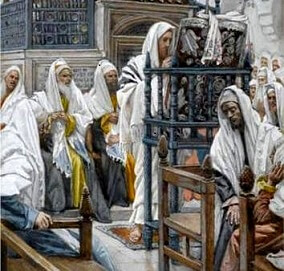 “I came to you in weakness and fear and much trembling, and my message were not with persuasive words of wisdom, but with a demonstration of spirit and power, so that your faith might rest not on human wisdom but on the power of God.” ~ 1 Corinthians 2: 3-5
“I came to you in weakness and fear and much trembling, and my message were not with persuasive words of wisdom, but with a demonstration of spirit and power, so that your faith might rest not on human wisdom but on the power of God.” ~ 1 Corinthians 2: 3-5
What beautiful words these are in the first reading, from the first letter of Corinthians. It is beautiful, because Saint Paul is so honest about his frailties. You can’t help but identify with them. This is what it means to be genuinely humble. However, Saint Paul had quite an advantage over us. Jesus Christ himself humbled the self righteous Saul, who later became Paul after his conversion.
The sentence that is especially beautiful, that stands out from all of the others in the first reading is the last verse:
” … so that your faith might rest not on human wisdom but on the power of God.”
Thank God for these words. They are healing on so many levels. We should never put all our ‘eggs in one basket’ so to speak. There are many charismatic leaders in the world, and in our church as well. Lay people sometimes put our priests ‘on a pedestal,’ especially if they are very holy themselves, and a good spiritual director for the parish. Parishioners can take every single word that a priest says as God’s truth, and most of the time it is. But, God transcends everything. He alone is holy.
Our faith is in God, not those who lead us, and help direct our lives, however holy (or imperfect) they may be. People are often like that in relationships as well, but eventually every single person you know will let you down, because like Saint Paul, they have weaknesses and are imperfect people too.
God transcends everything. He alone is holy. This is a thought that we should keep in mind when we move on to read today’s gospel …
After Jesus stood up to read in the synagogue in today’s gospel, he said, “Today this scripture passage is fulfilled in your hearing.” The gospel said all spoke highly of him and were amazed at the gracious words that came from his mouth. This is worth stopping to think about for a moment. Everyone spoke well of Jesus. His reputation preceded him and he was famous. When the townspeople began to ask Jesus to do all the things that they heard he had done in other places, it seems that Jesus intentionally provoked the entire synagogue. Why? Why would he make everyone in the whole place mad at him, on purpose?
Could it be because, like Saint Paul, he didn’t want to be put on a pedestal and be greatly admired, because God should be the one that people looked up to? Jesus always deflected the attention away from himself, and encouraged people to show the due worship to his Father. In all things, his Father came first, not himself. Remember when Jesus multiplied the loaves of bread and fish and fed 5,000 people? They wanted to carry him off and make him a king, but he slipped away from them so they couldn’t do it. This time, Jesus just provoked the whole town and when they got so angry they wanted to throw him off a cliff, he slipped away from them too.
There are many ways of looking at the gospel today, but it’s possible that Jesus provoked his hometown, so that it would damage the high esteem the townspeople held for him. Just like Saint Paul humbled himself in the first reading today.God is supposed to be in the first place, because he alone is holy. Jesus is holy too, but he always placed his Father higher than himself. He was humble. He washed his disciples feet, and he came to serve, not be served. The townspeople already held Jesus in high esteem, can you imagine what would have happened if he had performed very many miracles there? The whole town could have become puffed up with pride, because Jesus came from their town.
Jesus said, “Amen, I say to you, no prophet is accepted in his own native place,” and then he made sure of it immediately after saying this, by provoking the whole synagogue so much that they wanted to kill him. The townspeople tried to throw Jesus off a cliff. This doesn’t sound like Jesus’s life was filled with very much love, peace, harmony, and unity in today’s gospel.
If we are supposed to pick up our cross and follow him, like Sunday’s gospel said, then perhaps we can expect no less. Our lives would not reflect Christ’s, if we lived in perfect peace, love, harmony and unity all the time. Maybe it’s ok that most of us have imperfect lives. Jesus was the only perfect person, but he is the most controversial figure that has ever lived in the history of mankind. Christ’s own life was filled with disharmony, to the point that the people he grew up with tried to kill him.
Does our own lives reflect any of the readings for Mass today? If it does, then we are probably on the right track.
Daily Mass Readings:1 Corinthians 2: 1-5 / Psalm 119 / Luke 4: 16-30
